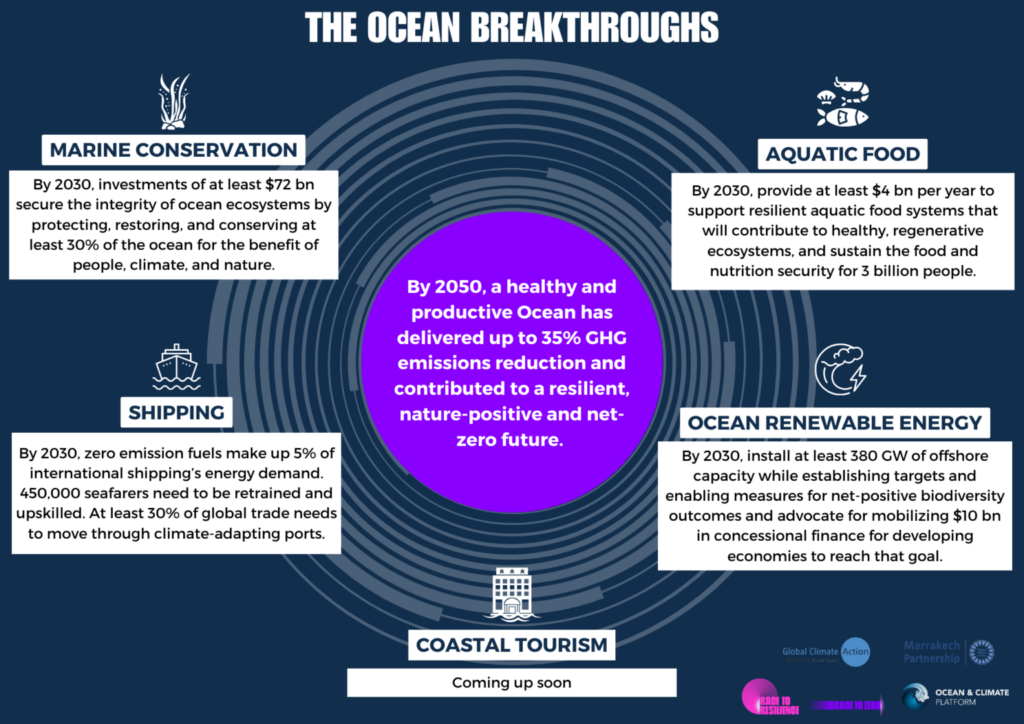The Marrakech Partnership at COP28: Launching the 2030 breakthroughs and what that means for coastal communities

The world is gathered in Dubai for the 28th Conference of the Parties under the United Nations Framework for Climate Change Convention, otherwise known as COP28. Over a two-week span, government delegations come together to negotiate what actions the world needs to take to achieve a future under 1.5 degrees. This will set the tone for government action and help guide policies to achieve the ambitions of the Paris Agreement.
Quite often, these negotiations dominate the splashy, dramatic media headlines — who is supporting a specific proposal, who is in staunch opposition and disagreements happen on the plenary floor! Less covered is how the non-party actors meaning — the rest of the world, including civil society, the private sector, philanthropies, universities, Indigenous peoples, local communities and youth — are activated at COP and in support of the Paris Agreement. Playing an utterly crucial role, non-state actors drive action on the ground and motivate movements across the world to support climate action.
The Marrakech Partnership for Global Climate Action (MP-GCA) is one example of a non-state actor effort launched by the High-Level Champions for Climate Change. Conceived as an idea at COP21 and established at COP22, MP-GCA is a cooperation between non-party stakeholders and governments “that aims to support implementation of more climate action now, consistent with the achievement of the national determined contributions (NDCs), and to foster greater ambition over time on mitigation, adaptation, and the delivery of finance, technology and capacity building to developing countries.”
To put it succinctly: how non-party stakeholders can advance climate ambitions by capturing and tracking voluntary efforts to ultimately understand the global initiatives in support of achieving 1.5 degrees.
The MP-GCA is organized into seven thematic areas to drive action in these critical sectors: land use, water, human settlements, transport, energy, industry, and ocean and coastal zones. For COP-28, each MP-GCA will launch a series of 2030 breakthroughs to catalyze mitigation and adaptation efforts that will allow for people and nature to thrive.
Within the ocean and coastal sector, five breakthroughs have been identified as “transformative pathways where accelerated action and investments could deliver up to 35% of greenhouse gas emissions reduction and contribute to a resilient, nature-positive and net zero future by 2050.
I’m excited to have co-led the Aquatic Food Sector Breakthrough in partnership with the UN Food and Agriculture Organization (FAO). Together with FAO, we have articulated the following Aquatic Food Breakthrough for 2030:
- By 2030, provide at least US$ 4 billion per year to support resilient aquatic food systems that will contribute to healthy, regenerative ecosystems and sustain the food and nutrition security for three billion people
We believe that this breakthrough can help to advance not only climate ambitions but also commitments to biodiversity under the Global Biodiversity Framework and for the health and well-being of communities around the world. Elevating this topic on the world stage is vital, as climate-related measures are largely absent from fisheries and aquaculture policies and management and minimal climate funding is directed to food systems (less than 4%!) — despite food systems driving one-third of greenhouse gas emissions and is the largest cause of global biodiversity loss.
Non-state actors have a crucial role to play in this breakthrough. From the private sector supporting the transition to low-carbon production methods, to academia supporting the development of science-based to enhance climate resilient management of blue food resources, to communities leading transformation on the ground — there are many ways in which actors can contribute to achieving this vision.
We hope that you can join as well and welcome you all to tracking the progress made at COP28 on blue foods. If you are in Dubai, we encourage you to join the below events to learn more about the Marrakech Partnership and the 2030 Breakthrough on Aquatic Foods. If you are unable to join in person, a live stream and video recordings will be available.
High-Level Event on Ocean: Powering the Ocean Breakthroughs with 100% Sustainable Ocean Management
- December 9, 2023, 14:00 – 15:30 (UTC+04:00)
- WCAS Theatre
- This high-level event will cast a spotlight on the ocean put forth country commitments towards the 100% Sustainable Ocean Management goal and showcase tangible actions supporting implementation of the Ocean Breakthroughs.
Nature, Land-Use & Ocean Action Day: “Nature First: From Land to Ocean, Our Best Ally for Climate Action”
- December 9, 2023 – 10:00 – 14:30 (UTC+04:00)
- Climate Action Zone
- This Marrakech Partnership event will highlight how the whole nature system, from land to ocean, is the fundamental pillar of life on Earth and must be front and center in climate action for a resilient, net-zero and biodiversity-positive world.
Marrakech Partnership Implementation Lab: Aquatic Food and Protein Transition
- December 10, 2023 – 14:00 -15:00 (UTC+04:00)
- Lab 1 (Al Shaheen)
- This event will convene civil society, private sector champions and policymakers to discuss the necessary actions for expanding the contribution of alternative proteins and aquatic food systems to climate, food security and nutrition, recognizing that a food system transformation exclusively focused on climate benefits will overlook, and even exacerbate, impacts related to biodiversity, water, air and human health.










